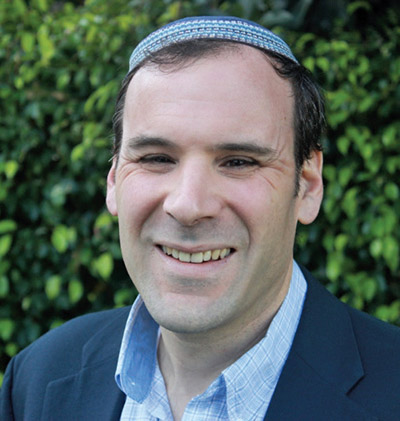


Rabbi Shalom Hammer spoke at Congregation Etz Ahaim in Highland Park on Sunday, November 19 about why youth from the Orthodox community become less observant, or opt to leave Orthodoxy altogether, and how this problem can be addressed.
Rabbi Hammer began his talk, “Off the Beaten Path,” by giving the audience the “good news and bad news.” The good news was that the topic would be addressed; the bad news was that there are no concrete solutions to the problem.
Rabbi David Bassous of Etz Ahaim opened the program by introducing Rabbi Hammer and noting the important work he is doing with the IDF by introducing religious observance to secular soldiers. Rabbi Bassous also noted the current concern in American yeshivas of the concept of “half Shabbat,” where students observe all the laws of Shabbat except one—using their cell phones to text their friends.
Rabbi Hammer noted that wherever Jews live, there are people who give up their observance. In Israel there is a term for people who are no longer religious–— “DatLashIm,” an acronym made up of Dati Lo Sheava, “was religious, is no longer.”
The neighborhood where Rabbi Hammer lives in Israel is very religious, yet of the 250 families who live there nearly half of them have at least one child who is no longer religious. They have left observance behind and many don’t believe in HaShem, observe Yom Kippur, or even give their sons a Brit Milah. How can this happen to children who were brought up religious? Rabbi Hammer noted that some people might blame the parenting of the families involved. Yet, if this was the case, why didn’t all the family’s children turn away from religion?
Rabbi Hammer discussed three possible factors: mandatory Army service (even the Hesder programs), the lack of engagement in the community and mere “chance.” He noted that when asked how it was that all his children were religious, he answered that, like Rav Soloveitchik, he prayed to HaShem every day that it would be so.
There is no guarantee or foolproof recipe to prevent young people from turning their back on their faith. He noted that the week’s parsha involved Yaakov and Eisav – who were raised in the same environment by Avraham and Sarah. Why did they turn out so differently? One explanation was that as much as the parents wanted to emphasize scholarship and learning and minimize the hunting/athletic instincts of Eisav, they were not sensitive to the differences between the two children and did not follow “Chinuch L’Naar Al Pi Darko,” to educate the child according to his abilities. Trying to force a square peg into a round hole will cause problems later on. Unless the needs of each child are taken into account, the risk is disengagement and lack of involvement in religion when the child grows up.
Rabbi Hammer also noted the power of effective communication and the impact it can have in family relationships. Today’s busy lifestyles often mean that the only time the family gets together is at the Shabbat dinner table, and even then the focus may not be on the family but on invited guests. He suggested bringing up topics about which family members are passionate. Even if the discussions become heated, they can serve to show that the opinion of each family member is valued.
The concept of Jewish thought, Machshevet Yisroel, is often not brought up until a child is grown. Questions about belief and faith need to be answered as soon as they are thought about. If questions about the existence of God are suppressed, the result may lead to lack of observance. The topics are often avoided because parents (and teachers) are simply not prepared to approach the subject. The topics are also not often addressed in rabbinical schools, and Rabbi Hammer believes that they should be included as part of the semicha learning.
He remarked that what speaks to youth today is very different from generations of the past. He noted the success of Carlebach-style minyanim, and how Sephardim daven in unison, and suggested those approaches as ways to reach the disengaged. “If someone feels they are part of the congregation, rather than just sitting there, they feel they are there for a purpose.”
Rabbi Hammer concluded with a tip for those with children who are no longer religious. The key is to always remember they are our children and we have to embrace them and never lose hope that they can come back. Embracing the principles of inclusion and increasing effective communication can have long-lasting positive effects.
Rabbi Hammer is well known as a motivational speaker for the Israeli Defense Force, an educator for secular kibbutzim throughout Israel and a lecturer for communities throughout the world.
Visit www.rabbihammer.com for more information about Rabbi Hammer’s programs with the IDF and for creating tolerance and understanding between religious and secular Jews.
By Deborah Melman










